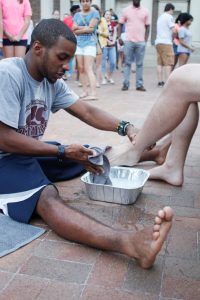Week 7: SERVANT LEADERSHIP
At Project Transformation, we believe Jesus is the foremost example of servant leadership. Scripture tells us of Jesus’ willingness to wash the tired, calloused, well-traveled (very dirty) feet of his disciples instead of asking them to wash his as their leader. Here’s what we believe about servant leadership:
- We practice Christ-inspired leadership which seeks to put the needs of others before self for the greater good
- We believe in sharing power and investing in others so that they may fully live into their God-given gifts, passions, and talents
- We believe in laboring with love, justice, compassion, humility, and accountability
- We believe in practicing rest which promotes personal wholeness and renewal
Catch the vision of Project Transformation and practice servant leadership!
LEARN: Check out The Heart of Coaching by Stephen Crane, Upside Down: The Paradox of Servant Leadership by Stacy Rinehart, or The Servant by James Hunter to learn more about servant leadership theory and practice. Try some of these servant leadership team-building games with your staff team! http://www.ehow.com/list_6753156_servant-leadership-games.html
ACT: At work or at home this week, search for areas of growth in humility. Consider 2-3 actions which display the Christ-like paradox of servant leadership…that there is power in vulnerability, more wholeness and life through first dying to ego. Put a teammate’s idea before your own. Choose understanding instead of irritation for someone who is a bit annoying. Be a boss who makes the coffee every now and then.
REFLECT: In a culture where burnout in ministry leaders is high and busyness is equated with importance and success, it is often difficult to discern our worth outside our “doing”—the currency of accomplishments, productivity, and/or cash. It is difficult to slow down and take time for “being,” allowing for soulful rest and replenishment. Take a few minutes to enjoy this poem.
Camas Lilies
by Lynn Ungar
Consider the lilies of the field,
the blue banks of camas opening
into acres of sky along the road.
Would the longing to lie down
and be washed by that beauty
abate if you knew their usefulness,
how the native ground their bulbs
for flour, how the settlers’ hogs
uprooted them, grunting in gleeful
oblivion as the flowers fell?
And you—what of your rushed
and useful life? Imagine setting it all down—
papers, plans, appointments, everything—
leaving only a note: “Gone
to the fields to be lovely. Be back
when I’m through blooming.”
Even now, unneeded and uneaten,
the camas lilies gaze out above the grass
from their tender blue eyes.
Even in sleep your life will shine.
Make no mistake. Of course
your work will always matter.
Yet Solomon in all his glory
was not arrayed like one of these.




